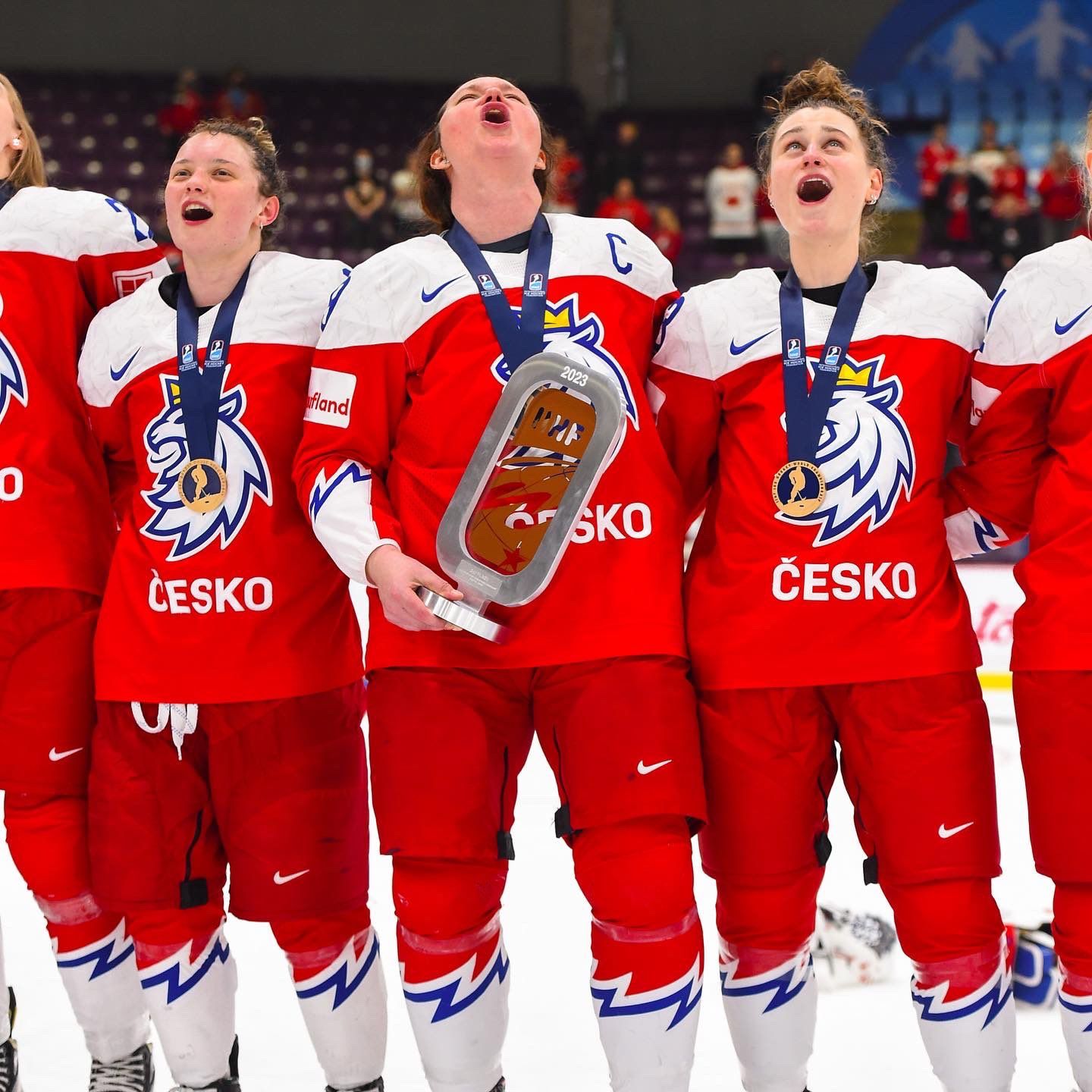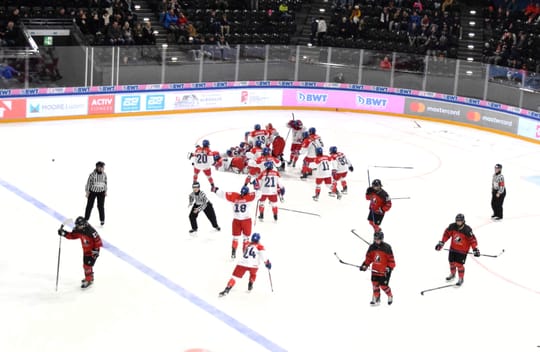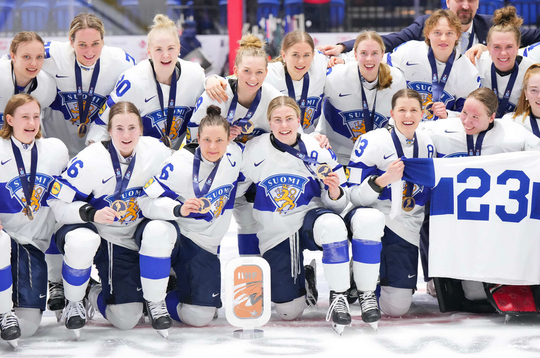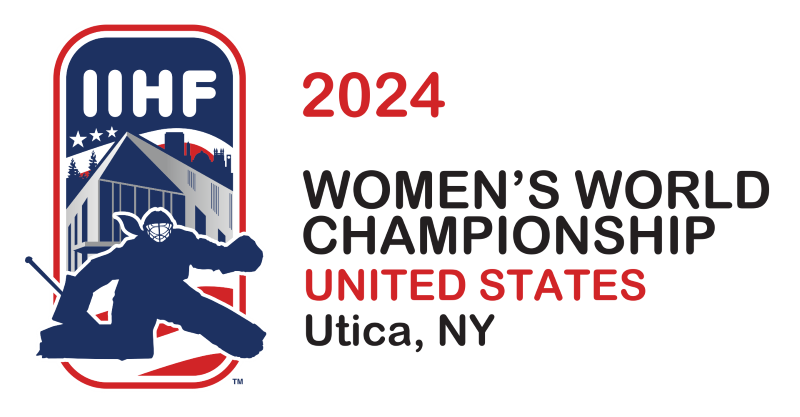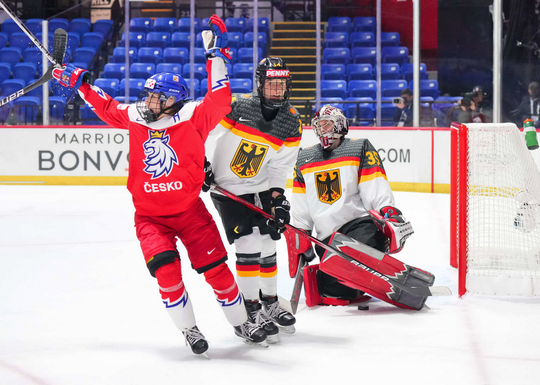At the 2023 IIHF Women's World Championships in Brampton in April, Czechia won their second-straight bronze medal, solidifying them as the third-best team in the world and proving that their 2022 win was no fluke.
It turned out to be the final game with Team Czechia for captain Alena Mills, who announced her retirement on Thursday June 8. That bronze medal capped a national team career that spanned 260 games over 19 years, in which the forward scored 102 goals and added 133 assists.
Mills joined the team in 2004 at the age of 14 – two years before current teammate Adéla Šapovalivová was even born.
Over her first 11 years with the team, the Czechs moved between Division I, Division IA and Division II, experiencing all the ups and downs of promotion and relegation. In 2012, they made their way to the Top Division, only to be relegated the next year. In 2015, they moved up to the Top Division again, but never finished above sixth before their historic 2022 bronze – the first medal in women's hockey in the country’s history.
Czechia also qualified for their first-ever Olympics in 2022. Mills had gone through four failed Olympic qualification cycles (2006, 2010, 2014, and 2018) – finishing as runner up two different times.
All of those years – full of missed opportunities and fighting for position, reaching new heights, and inestimably growing women's hockey in Czechia – were on her mind in the mixed zone after the semifinals and bronze medal game in Brampton.
"I'm remembering all those years and how much we fought for and how much better the team has gotten. I'm super proud of the girls and how far we've come and super thankful to be a part of it. Being a part of Czech women's hockey going this far, I couldn’t even have dreamed of that. Back then I dreamed of getting to the top division, it wasn't even medals," said Mills.
"That was my goal for Czech hockey, to get us to Group A. Once you're in Group A, it's easier to move forward and get that experience from playing the best teams in the world. It's a dream come true. I'm definitely happy that I've lived through it and I've been part of it."
Throughout her time with Team Czechia, Mills has found herself readjusting those goals. Every step they took, she got to dream a little bigger. Top division, top group, medals. It's all a little unfathomable for her and she got choked up thinking about all the times she thought about retiring or moving on.
"Certain times you don't see a future in it. It's not moving forward and you question if it's worth it or not," she said.
Czechia coach Carla McLeod had been at the helm for about a year when her team won the second bronze. But she said that in Denmark in 2022 and in Brampton, it was long-time players like Mills that caught her attention in the immediate celebrations.
"That's a woman that has given a lot to this program and has stayed the course through the ups and downs. When I look around the room, I look at her and think, You deserve this." said McLeod. "You need drivers like [Alena] as a group is growing and developing. For her, she has really settled in and weathered."
In April, Mills said her hopes for the future of the team included earning automatic Olympic qualification so the team never have to go through that cycle again. And earning some even better bling.
"I'm glad we were able to defend it and get the bronze again and I just hope that in the future we get those shinier medals," she said.
"Back in the day, there wasn't much competition to get on the national team. Now there's a lot of competition. All those girls will have a harder time getting there, but they also can go further at the international level. That's what I look forward to."
Trailblazer
There's no delicate way to say that Czechia's improvement on the international stage came when individual players began to take control of their own development. Mills was apologetic, but frank about the state of women's hockey in Czechia. The women's league there (Extraliga žen) is not good enough to support the growth of talent needed to compete internationally.
She recalls that as she reached her teenage years, she realized that there were no options for her at home if she wanted to keep playing hockey. She'd fallen in love with the game in 1998, when the Czech men won the Olympic gold medal and the women's game debuted in Nagano. She was young enough to dream of the NHL and not know any better. But as she thought about the next steps of her education, she realized there was no way to combine that with hockey.
Mills made the connections to come to North America for a year of high school and then played four years at Brown University. By that point, a number of women from Europe had been recruited to the NCAA, but she was one of the first from Czechia and her experiences helped create a pipeline. On the 2023 Team Czechia women's roster, 14 of the 22 players were current, former, or committed NCAA players.
Attending university in North America offered not just the opportunity to play high level hockey, but also to learn about strength/conditioning and nutrition, all while getting an education. Mills said she thought other girls' hockey players in Czechia had never considered moving to North America as an option. She wasn't knowingly blazing a trail at the time, but her experience and development showed the possibilities of what playing in the NCAA could mean for Team Czechia.
"The other girls saw how much I developed. Strength and conditioning. Other girls saw I went to the US and I kept growing and kept getting better. That was a driver for them," Mills said. "NCAA is the best women's hockey I've ever seen and obviously women's leagues are developing, but I think it's an amazing opportunity and it opens doors."
In addition to helping them become better players for the national team, playing in the NCAA also opened doors for professional play in Sweden, Finland, Russia, the United States, and more.
Mills said that in her experience, European coaches recruit NCAA players because they are developed and disciplined.
"They have good work ethic. They have time management. They know how to take care of their body. They've gone through the crazy college years and are now ready to be professionals," she said.
Mills agreed "one million percent" that it's fair to say that the improvements that both the senior national team and U18 team have shown can be attributed to this development that the players went out and got on their own.
Mills remained committed to the national team through the ups and downs of promotion and relegation; the whole team was focused on getting better and taking direction from the team's previous coach, Tomáš Pacina, and now from Carla McLeod.
"Watching how our girls go play abroad – they play in the NCAA, they play in Sweden, Russia, Finland, wherever it is – they collect all the hockey know-how, and then we all come together, and I saw the team growing," she said.
That perseverance paid off in the past two years, with the first Olympic appearance and two bronze medals in both the 2022 and 2023 World Championships.
Legacy
The women’s league may have room to improve, but it’s no longer unusual to see girls and women playing hockey in Czechia. The attitude around the country began to change with the team's Olympic berth. Fans started paying attention.
"It wasn’t necessarily about the results, but how they felt when they watched our games. They were pulled into it," Mills said.
In her Instagram post announcing the retirement, Mills said:
After 14 years I am pleased to pass on the captain's "C" to a new generation of talented and determined female hockey players. I believe that the journey of Czech women's hockey is only just beginning and that the new generation will achieve what seemed impossible to us years ago.
Whatever Team Czechia achieves in the future, they will be doing it thanks to the influence and impact of Mills.
(Photo: Czech Women's Hockey/Twitter)
